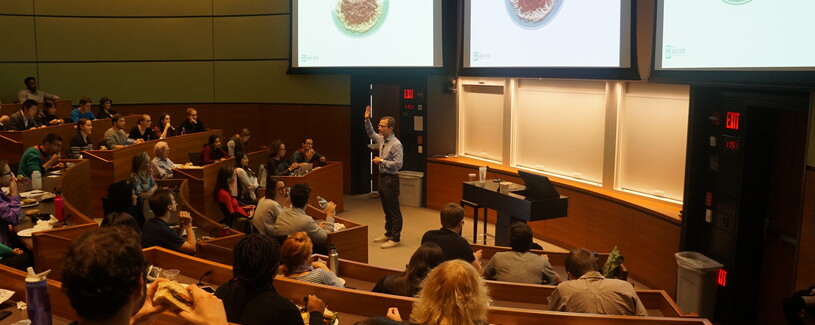Calories Per Pound of Beef, Chicken, Hog

Meat makes for curious math: about 25 calories is required to create just 1 calorie of beef. The ratio for pork is nearer 15-to-1. Even the most efficient meat, chicken, requires 9 calories of input to produce just 1 calorie of food.
Bruce Friedrich, Founding Trustee at New Crop Capital and Executive Director at The Good Food Institute, likens the consumption of chicken to tossing eight plates of pasta in the trash for every one that we eat. "Essentially we're entering into a relationship wherein 800 percent of what is grown is thrown away," he said at a September 29 talk at the Yale School of Management. "That is just one of the reasons that animal agriculture is crying out to be disrupted."
The solution, according to Friedrich, is plant-based protein and "clean meat" (often disparagingly referred to as "lab-grown meat"; Friedrich argues that the lab-grown label is wrong, pointing out that all processed food starts in a lab but that once commercialized, this meat will be cultured in factories that resemble breweries, not in laboratories).
Friedrich is not alone in his optimism about alternatives to conventional meat. Microsoft's Bill Gates has invested in the potential; Silicon Valley harbors a growing roster of startups oriented around meat substitutes; Eric Schmidt, Executive Chairman of Alphabet (Google's parent company), considers replacements for meat one of today's most important tech trends.
And why? Friedrich identified four central reasons that conventional meat consumption must be reined in. First, food that is a net caloric loss is directly at odds with the need to address global poverty and support 9.7 billion people by century's end. Second, raising livestock is, "one of the most significant contributors to the most serious environmental problems, at every scale from local to global," according to a report [pdf] by the UN Food and Agriculture Organization. Third, the overconsumption of meat is a recognized public health concern. And fourth, the current global meat industry raises serious concerns over the ethical treatment of employees and animals. (It's been calculated by poultry scientists at the University of Arkansas that humans growing at the same rate as modern genetically altered boiler chickens would weigh 600 pounds in less than a year)
Despite these problems, people aren't simply going to abandon meat consumption. A vast literature on why people make the dietary choices that they do can be summarized simply: price, taste, and convenience. "For the vast majority of people, ethics don't figure in," Friedrich said. "So we want to create products that take ethics off the table"—a particularly pressing goal as global demand for meat grows.
A number of startups (some funded by Friedrich's own venture capital fund) are developing highly realistic and intensely flavorful proteins that are either plant-based or will be grown in huge vats akin to those found in breweries. Friedrich's nonprofit, The Good Food Institute, also plans to work with the meat industry, where internal murmurings are noting shifts in consumer demand. A recent article in Meat and Poultry highlighted how, "a coalition of 40 institutional investors with a valuation of $1.25 trillion is making a business case to several multinational food manufacturers for the adoption of alternative proteins instead of traditional meat and poultry production." Lux research predicts that plant-based meat, currently 0.25 percent of the nearly $200 billion meat market, will grow to one-third of the market by 2054.
In the end, Friedrich compared the agricultural shift underway to what took place in the transportation sector at the turn of the twentieth century. "I am absolutely convinced that the myriad problems of animal agriculture will be solved by a combination of food technology and ethics," he said. "We will come in the fairly near future to see the idea of raising animals to eat them as just as ludicrous as the idea of hopping on a horse and setting of for San Francisco."
Source: https://cbey.yale.edu/our-stories/disrupting-meat
0 Response to "Calories Per Pound of Beef, Chicken, Hog"
Post a Comment